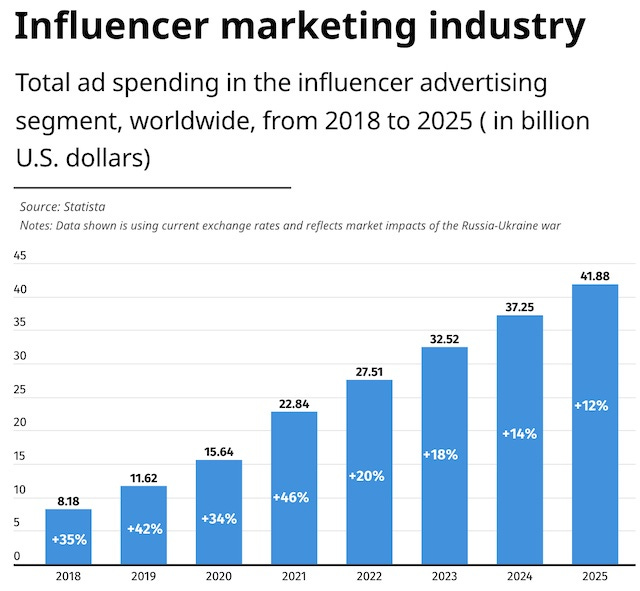From Individual Influence To Collective Impact
Why creatives need to work together more than ever.
‘If you want to go fast, go alone. If you want to go far, go together.’
In today’s interconnected world, creativity is shifting from the myth of the solitary genius to the undeniable strength of collective effort.
This new renaissance values collaboration and shared contributions as essential. Beyond the cultural shifts, however, lies another critical driver: the evolution of consumer marketing…
The Creator Economy Democratises Creativity
The creator economy shows no signs of slowing down. Goldman Sachs predicts its market size will nearly double, leaping from $250 billion today to a staggering $480 billion by 2027. But this explosive growth isn’t just about individual creators striking it big; it’s fueled by the collective power of creators working together and with global brands.
As covered in our previous articles on the Fine Art and Recorded Music markets, the creator economy is a powerful democratizing force. It removes traditional gatekeepers and empowers individuals to directly reach audiences through platforms like YouTube, TikTok, and Patreon. Creators can now monetize their work independently, bypassing institutions and engaging global audiences.
This is more than economic empowerment; it’s a cultural shift. Creators are not only producing content but shaping new forms of collaboration that amplify their impact across industries.
The Power of the Collective
“Partnering with creators has become essential for brands.” - Maayan Sarig, Head of Communications and Partnerships at Meta

However, in this quickly evolving ecosystem, collaboration has become king.
One trend gaining momentum is influencer and creator collectives. These groups bring creators together to pool resources, audiences, and skills. By collaborating, they’re able to produce innovative content and reach larger audiences, making a far greater impact than working individually.
The focus moves towards deep, strategic relationships between brands and select groups of content creators.
Joe Gardner, Community Strategist at Ogilvy, explains: “It used to be that brands would have one big hitter, then it was one medium hitter and a bunch of small ones, and then smaller hitters with smaller channels but more of them, to now having ginormous seeding programs with a few key creators.”
The rise of these partnerships reflects a broader trend: creators are no longer isolated influencers competing for attention. They’re embracing co-operation, sharing creative processes, and forming collectives to navigate the demands of digital marketing and audience engagement.
Late-Stage Capitalism and the Push for Collaboration
In many ways, the relationships between creators, brands, and audiences have become increasingly transactional. Influencer marketing, once celebrated for its authenticity and grassroots appeal, is now critiqued for its commercialism.
Faced with this challenge, creators are turning to collaboration as a way to restore meaning and purpose to their work. Instead of competing for attention in isolation, they’re teaming up to share the burden of content creation and foster deeper engagement with their communities.
Yancey Strickler, co-founder of Kickstarter and Metalabel, describes this as “creativity in multiplayer mode.” By pooling resources and aligning efforts, creators are shifting from “single-player” endeavors to “multiplayer” collaboration — a model that’s not only more sustainable but also more impactful.
The Venture ecosystem has a lot to learn from creator communities.
As the creator economy evolves towards this collective approach there are new problems for startups to address. Startups can build tools to streamline partnerships, optimize monetization strategies, and provide scalable solutions for content creation and audience engagement.
At the same time, founders in across all industries can draw inspiration from creator communities that emphasize collaboration over competition. Just as creators form collectives to amplify their impact, founders and investors can establish networks to share resources, expertise, and support.
If you’re building for or working in the creator economy or creative industries we would love to hear your thoughts in the comments.






